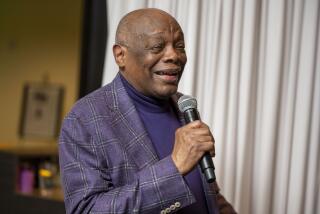Oscar Brown Jr., 78; Portrayed Black Culture in Music, Poetry and Theater
- Share via
Oscar Brown Jr., a singer and songwriter whose work reflected the humor and hard truths of the black experience in America, has died. He was 78.
Brown died of respiratory failure Sunday at St. Joseph’s Hospital in Chicago, said his daughter, Maggie Brown. She said her father was admitted to the hospital May 5 with a bacterial infection and underwent extensive surgery May 16 to try to stem the infection, but his condition deteriorated rapidly.
The multitalented Brown was a poet, actor and activist as well as a musician. In a New York Times interview some years ago, he said he set out to “deliberately present the culture in which I’d grown up. I wanted to present a picture of black culture to anyone who could hear it.”
And he did just that in his songs, plays and musicals, which offered a strong sociopolitical point of view.
Released in 1960, his first album, “Sin & Soul ... and Then Some” on Columbia, was a hit. A mosaic of poetic and musical images, the album included his lyrics for such popular jazz instrumentals as Nat Adderley’s “Work Song,” Bobby Timmons’ soul jazz tune “Dat Dere” and Mongo Santamaria’s “Afro Blue.”
It also included the socially charged “Bid ‘Em In,” a vivid re-creation of an auctioneer’s call at a female slave sale. The album is still considered a classic by critics and aficionados.
In his hometown of Chicago, Brown was known in the 1960s for his theatrical works that offered vivid impressions of urban life. In one instance, he helped quell gang violence in the city by employing members of the notorious Mighty Blackstone Rangers in the revue “Opportunity Please Knock.” He also created the musical version of “Big Time Buck White,” which starred Muhammad Ali and had a brief run on Broadway.
Other theatrical works created during that time included “Kicks & Co.,” which was featured by host Dave Garroway on an entire segment of the “Today” show in what was in effect a backers’ audition. The musical had a short run on Broadway.
In the early 1970s, Brown premiered a musical drama, “Slave Song,” written in iambic pentameter and rhymed quatrains. Underwritten by Howard University, it had a short run in Washington, D.C.
Brown worked as an actor on such television shows as “Brewster Place,” featuring Oprah Winfrey, and “Roc,” starring Charles S. Dutton. Widely knowledgeable about jazz and blues, he was the host of two programs on music: “Jazz Scene USA” in 1962 and “From Jump Street: The Story of Black Music” on PBS in the 1980s.
His songwriting brought acclaim from critics and leading artists.
Playwright Lorraine Hansberry said Brown had “a startling genius for rendering sense and nonsense into acutely succinct and brilliant summaries of life as we live it.”
Critic Nat Hentoff said, “Here, finally, is a performer and writer who is so authentically hip that he never overstates his authority.”
But Brown’s work may have been too hip and authoritative for the music business. His albums never found a broad crossover audience and by the mid-1970s he was without a music contract. His career had gained new interest in the 1990s after Rickie Lee Jones covered “Dat Dere.” In 1994, he recorded his first album in almost 20 years, “Then and Now,” for Weasel Disc records.
For much of Brown’s career, critics lauded his work and lamented his lack of popular recognition.
“He was a very riveting performer who could write about contemporary issues with a lot of bite and wit,” Hentoff told the Los Angeles Times on Sunday. “I was always surprised that he never got the acclaim he deserved.”
Writing in The Times in 2002, critic Don Heckman offered similar thoughts: “Every time Oscar Brown Jr. shows up in Los Angeles to deliver one of his inspired performances, I’m mystified about why he does not receive wider recognition.”
The son of a lawyer and onetime head of the local National Assn. for the Advancement of Colored People, Brown was born in Chicago on Oct. 10, 1926. While in high school, he appeared on Studs Terkel’s children’s radio series, “Secret City,” but did not immediately launch an entertainment career.
From the early 1940s to the early ‘50s, he attended several colleges and worked in a variety of jobs, including advertising copywriter, real estate agent and publicist. He ran unsuccessfully for the Illinois General Assembly on the Progressive ticket in 1948 and was the host of one of Chicago’s first televised newscasts aimed at a black audience. He ran for Congress in 1952 and lost.
After all that, he spent two years in the Army. Although he had written poetry and songs over the years, he turned to professional songwriting only after his discharge in 1956.
His first recorded composition was “Brown Baby,” written after the birth of his son, and recorded by Mahalia Jackson, Diahann Carroll and Lena Horne, among others.
In 1960, he collaborated with drummer Max Roach on “We Insist! Freedom Now Suite.” The same year, he was signed to a recording contract with Columbia.
He wrote more than 500 songs and added lyrics to such jazz favorites as the Miles Davis composition “All Blues.”
For much of his performing career, Brown worked with his wife, singer Jean Pace Brown, who survives him. In addition to his daughter Maggie, who also performed with her father, Brown is survived by daughters Africa Pace Brown, Iantha Brown Case and Donna Brown Cane.
He is also survived by 16 grandchildren and four great-grandchildren. His son, Oscar Brown III, a bassist who performed with his father in the 1980s, died in 1996.
More to Read
The biggest entertainment stories
Get our big stories about Hollywood, film, television, music, arts, culture and more right in your inbox as soon as they publish.
You may occasionally receive promotional content from the Los Angeles Times.










